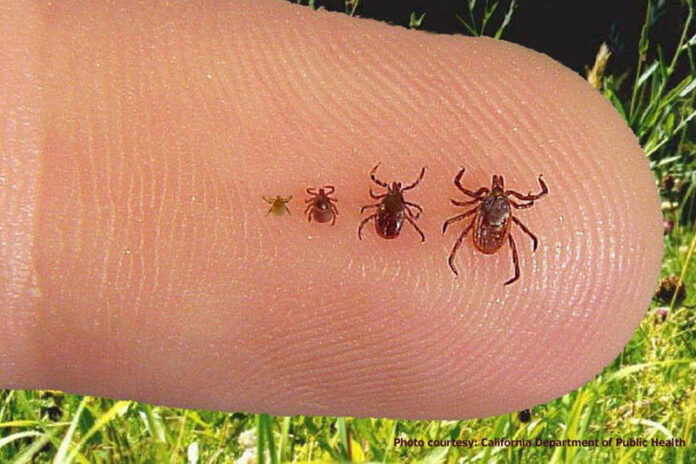Tick season ramping up
According to the Centers for Disease Control, Lyme disease is the most common vector-borne disease in the United States. Officials at the Marin/Sonoma Mosquito and Vector Control District are reminding residents that prevention before, during and after being in tick habitat is key when it comes to protection against ticks and tick-borne diseases.
“The poppy seed-sized nymphs are active during this time of year and about 4 percent of them harbor the bacteria that can cause Lyme disease,” said Kelly Liebman, Scientific Programs Manager for the Marin/Sonoma Mosquito and Vector Control District. “It is important to prevent bites and always check yourself and your pets for ticks after being outdoors.”
District staff conduct routine tick surveillance at various parks and public lands throughout Marin and Sonoma counties. Once collected, the ticks are tested for Borrelia burgdorferi, the bacterium that causes Lyme disease. The average infection rate among adult western black-legged ticks is between 2.3 and 3 percent in any given year.
Follow these steps to help minimize exposure to ticks and tick-borne diseases:
Repel: Apply an EPA registered insect repellent such as DEET (at least 25 percent), IR3535, oil of lemon eucalyptus (PMD) or Picaridin. Treat clothing and equipment with permethrin. Wear light-colored long-sleeved shirts and long pants.
Inspect: Periodically conduct tick checks on yourself, your children and your pets during and after being in tick habitat.
Remove: Remove attached ticks promptly and correctly. Using a fine-tipped tweezer, grasp the tick as close to the skin as possible, and pull straight out. Remove clothing and place in the dryer on high heat for 10 minutes to kill ticks before washing. Showering after being outdoors will help identify attached ticks and wash off those that have not yet attached themselves.
Lyme disease may produce a wide range of symptoms. If you believe that you have been exposed to the bacterium that causes Lyme disease, contact your health care provider. If Lyme disease is left untreated, the infection may spread to other parts of the body, with many patients experiencing severe pain and swelling associated with arthritis. Untreated patients may also develop chronic neurological problems.
More information about ticks and tick-bite prevention can be found at http://msmosquito.com/ticks.
62.5
F
Healdsburg
April 19, 2025








